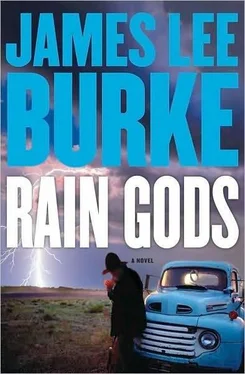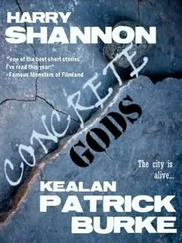“Hack?” she said.
“I’m fine.”
“Look out your window in the parking lot.”
“At what?”
“Look.”
He went to the window and gazed down at the rows of parked cars and the palm trees on the lawn and the tunnels of smoky light under the surface of the swimming pool. He could see nothing of note in the parking lot. But for just a second he thought he saw a shadow cross the clipped grass between two palms that were scrolled with strings of tiny white lights, then disappear through a piked gate on the far side of the pool.
He went back to the door that connected his and Pam’s rooms and slid the bolt. “Open your side,” he said.
“Just a minute,” she said.
A few seconds later, she pulled open the door, wearing jeans, her shirt hanging outside her belt. Her hairbrush lay on top of her bedspread.
“What did you see?” he asked.
“A guy in a tall hat like the Mad Hatter’s. He was standing by our car. He was looking up at the motel.”
“He do anything to the car?”
“Not that I saw.”
“We’ll check it out tomorrow.”
“You couldn’t sleep?” she said.
“About every third night, a committee holds a meeting in my head.”
She sat down on the stuffed chair in front of him. She was wearing moccasins without socks and no makeup, and the side of her face was printed with the pillow. “I need to tell you something, and I need to do so because it involves something you won’t acknowledge yourself. Collins cuffed you to your bed, but you tore it apart trying to stop him from killing me. You went after him when you had only a pistol and he had a Thompson machine gun. He could have cut you in half, but you went after him anyway.”
“You would have done the same.”
“It doesn’t matter. You did it. A woman never forgets something like that.”
He smiled at her in the darkness and didn’t reply.
“Don’t you like me physically? Do you think I’m not pretty? Is it something like that?”
“The problem isn’t you, Pam. It’s me. I misused women when I was young. They were poor and illiterate and lived in hovels across the river. My father was a university professor. I was an attorney and a war hero and a candidate for Congress. But I used these women to hide my own failure.”
“What does that have to do with me?”
“I don’t want to use someone.”
“That’s what it would be, then? ‘Use’?”
“How about we kill this conversation?”
She got up and walked past his chair, beyond his line of vision. He felt her fingers touch his collar and the hair on his neck. “Everybody is made different. Gay people. Young women who want father figures. Men who need their mothers. Fat girls who need a thin man to tell them they’re beautiful. But I like you for what you are and not out of a compulsion. I never put strings on a relationship, either.” She rested her palm on his shoulder blade. “I admire you more than any human being I’ve ever met. Make of that what you want.”
“Good night, Pam,” he said.
“Yeah, good night,” she said. She leaned over him, folding her arms on his chest, her chin on his head, pressing her breasts against him. “Fire me for this if you like. You were willing to give your life to save mine. God love you, Hack. But you sure know how to hurt someone.”
BOBBY LEE HAD driven through the darkness and into the morning with the sunrise at his back, the flood of warm air and light spreading before him across the plains, lifting mesas and piles of rock out of the shadows that had pooled on the hardpan, none of it offering any balm to his soul.
He had put his money on Preacher because Preacher was smart and Artie Rooney wasn’t. He was double-crossing Hugo because Hugo was a viper who’d park one behind your ear the first time the wind vane swung in the opposite direction. Where did that leave him? He had teamed up with a guy who was smart and had large amounts of money in offshore accounts and had probably read more books than most college professors. But Preacher was not necessarily smart in the way a survivor was smart. In fact, Bobby Lee was not sure Preacher planned to be a survivor. Bobby Lee wasn’t sure he liked the prospect of becoming the copilot of a guy who had kamikaze ambitions.
He drove across a cattle guard onto Preacher’s property and stared disbelievingly at the stucco house that the bikers had destroyed and Preacher had paid a dozer operator to blade into a two-story pile of scorched debris. Preacher was now living in a polyethylene tent at the foot of the mountain behind the concrete slab the dozer had scraped clean. His woodstove sat outside it, and next to it was a vintage icebox with an oak door and brass hinges and handle and a drawer underneath that could be filled with either crushed or chopped-up block ice. Behind the tent, against the mountain, was a portable blue chemical toilet.
Clouds had moved across the sun, and the wind was blowing hard when Bobby Lee entered the tent, the flap tearing loose from his hands before he could retie it. He sat down on Preacher’s cot and listened to the brief silence when the wind slackened. “Why do you stay out here, Jack?”
“Why shouldn’t I?”
“The cops aren’t interested in your house getting blown up?”
“It was caused by an electrical short. I make no trouble for anyone. I’m a sojourner who checks books out of the library. These are religious people. Disrespect their totems and feel their wrath. But they don’t take issue with a polite and quiet man.”
Preacher was sitting in a canvas chair in front of a writing table, wearing a soiled long-sleeve white shirt and small nonprescription reading glasses and unpressed dark slacks with pin stripes and a narrow brown belt that was notched tightly into his rib cage. On the table was a GI mess kit with a solitary fried egg and blackened wiener in it. A Bible was open next to it, the pages stiff and rippled and tea-colored, as though they had been dipped in creek water and left to dry in the sun.
“You’re losing weight,” Bobby Lee said.
“What are you not telling me?”
Bobby Lee’s brow furrowed, the implicit criticism like the touch of a cigarette to his skin. “Holland was at the Dolan house. Then he went to a motel with the woman who capped Liam. That’s all I know. Jack, let go of the Dolan family. If we got to take care of the Gaddis girl, let’s get on with it. Hugo told you where she’s working. We grab her and the soldier boy, and you finish whatever it is you got to do.”
“Why do you think Hugo told us where she was working?”
“If we see Hugo or any of his talent around, we splatter their grits. That number you did on those bikers was beautiful, man. A hooker dimed them for you after she screwed them? You know some interesting broads. Remind me not to get in the sack with any of them.”
“My mother is buried here.”
Bobby Lee wasn’t making the connection. But he seldom did when Preacher started riffing. The wind was blowing harder against the tent, vibrating the aluminum poles, straining the ropes tied to the steel pins outside. A ball of tumbleweed smacked against the side, freezing momentarily against it, then rolling away.
“You asked why I live here. My mother married a railroad man who owned this land. He died of ptomaine,” Preacher said.
“You inherited the place?”
“I bought it at a tax sale.”
“Your mom didn’t leave a will?”
“What business is it of yours?”
“It isn’t, Jack,” Bobby Lee said. “Those guys you had to deal with in the motel room? They were Josef Sholokoff’s people?”
“They didn’t have time to introduce themselves.”
“I have to line out something to you. About Liam. It’s eating my lunch. I set him up in that café. I called him on my cell and said that Holland had made him. I split and let him take the fall.”
Читать дальше












